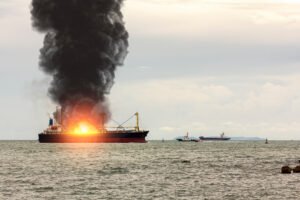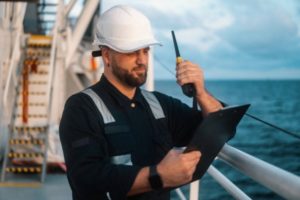
Marine vessels that spend their time exploring natural resources on the Gulf Coast are some of the most dangerous workplaces. Located in remote areas that often experience extreme weather, off-shore workplaces present significant opportunities for injury every day. Many of the brave maritime workers who face these risks live right here in the Breaux Bridge area.
If you or a loved one has recently been involved in an off-shore accident, a Breaux Bridge off-shore accident attorney can help. Our lawyers can help you pursue compensation through an injury claim or wrongful death lawsuit. We can answer your questions, offer legal counsel, and take care of every aspect of your case.
How Can a Breaux Bridge Off-Shore Accident Lawyer Help?
The subsequent weeks and months after an accident can be incredibly stressful for the off-shore workers injured every year on the job. Depending on the severity of your injuries, you may be looking at a week or two of recovery, months or years of rehabilitation, or permanent disability. Regardless, you’ll likely be unable to work for a while as your medical bills pile up.
Hiring a lawyer could benefit both your off-shore injury case and improve your mental health by relieving a bit of stress. This is because negotiating a successful personal injury case can be a long, complex process interspersed with plenty of bureaucracy and red tape. The last thing you’ll want to do while in recovery is file paperwork, interview expert witnesses, or collect evidence.
Going it alone will direct your time and energy away from healing and elevate your stress levels. An off-shore accident attorney right in the Breaux Bridge area can do all of the above tasks for you while you rest and recover from your injuries. Furthermore, they can handle negotiations with the insurance providers and defend your case before a judge or jury if negotiations don’t lead to a fair settlement.


Laborde Earles injury was great for me they took care of me very fast and professional. If for any reason I need legal help they will be who I use.
ClientDoes Federal Law Protect Off-Shore Workers?
Like all workers in the United States, off-shore workers have legal protections that allow them to seek damages if they sustain injuries at work. However, since they work way out in the ocean away from the jurisdiction of any state, off-shore workers are not covered by the Workers’ Compensation Program. This is where federal maritime law steps in. Based on the circumstances of your specific case, your injury attorney could seek damages through either of the following maritime laws:
The Jones Act
The Jones Act (also called the Merchant Marine Act of 1920) allows off-shore workers who sustain marine injuries while working to file injury lawsuits against their employers. Remember, off-shore workers must meet certain conditions before qualifying for coverage as Jones Act seamen.
To be considered a seaman, you should be employed on a single water vessel or fleet of vessels owned by a single entity. You should also be engaged in work that somehow contributes to the vessel’s functionality. The vessel should have been in navigation on the ocean or inland waterways during the accident. You could be eligible for coverage under the Jones Act if you were injured while working in a diving vessel, drillship, floating barge, cargo ship, cruise ship, or tanker.
Filing a Jones Act Claim
You’ll have to meet certain conditions if you want to file a lawsuit under the Jones Act. Here’s what you should do:
- Report your injuries. Inform your employer, captain, or any senior officer of the accident and your injuries. You must report an on-the-job injury to your employer within seven days.
- Seek medical attention. Off-shore injuries tend to be severe and can be made worse if they aren’t treated soon enough.
- Keep records of your medical treatment. This includes any medical bills or documentation of your injuries (x-rays, etc.). These records will show the extent of your injuries and connect them to the off-shore accident.
- File your report correctly. File an accident report detailing what happened just before the accident. You should consider doing this when in the right frame of mind, as this report includes a section indicating who was at fault. A Breaux Bridge off-shore accident attorney can help you file this report.
The Longshore and Harbor Workers’ Compensation Act (LHWCA)
The Longshore and Harbor Workers’ Compensation Act (LHWCA) allows employees who receive disabling injuries while working off-shore jobs to pursue compensation. The LHWCA covers employees involved in the building, repairing, dismantling, loading, and unloading of maritime vessels. It also provides coverage for employees who work in areas that adjoin U.S. waters, like piers, docks, and shipping terminals.
An extension to the LHWCA called the Outer Continental Shelf Lands Act (OCSLA) allows employees working on oil drilling rigs to pursue compensation when injured. An attorney from our firm can help determine exactly which maritime law applies to your situation.
Death on The High Seas Act (DOHSA)
The Death on the High Seas Act allows surviving family members of an off-shore worker to sue their employer if the worker loses their life in an off-shore accident. One of our Breaux Bridge lawyers can tell you more and gently guide you through the legal aspects of this difficult time.


I thank God for Digger & David. I don’t know what we would have done if it hadn’t have been for them.
Rick Smith | ClientDamages You Can Pursue After an Off-Shore Injury
Ultimately, the kinds of damages you can pursue will depend on your injuries and how they impact your life. You might be eligible to sue for the following damages after an off-shore accident:
- Pain and suffering
- Therapy
- Rehabilitation
- Present and future treatment costs
- Lost wages
- Loss of income earning potential
- Wrongful death


The reassurance from Digger and his staff gave me that renewed hope that it’s going to be okay down the road.
ClientCall Laborde Earles Injury Lawyers for a Free Consultation
Has an off-shore accident in Breaux Bridge left you hurt and facing unexpected medical bills? Have you lost a loved one in an accident caused by their off-shore employer’s negligence? At Laborde Earles Injury Lawyers, our attorneys can help with these situations and more. Contact us today to schedule a free consultation. We work on a contingency basis, so we don’t charge any upfront fees or costs to get started.



